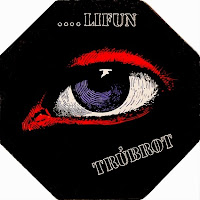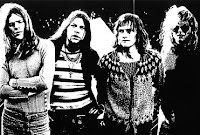Download from [mf]
pass: tdats
Welcome to the sixth Nordic TDATS, after Denmark (Vol72), Sweden (Vol75), Norway (Vol81), Finland (Vol88) and the first one, (Vol28), which was a mix.
Some time ago I discovered the heavy names that are generally known from the Nordic island country of Iceland; Trúbrot, Thor's Hammer, Óðmenn, Andrew, Icecross and Svanfridur. It's time to look further, and considering that in the seventies Iceland had a population of only 200-225 thousand, I found a pleasing amount of good stuff. Looking at the selection, this volume reminds me most of the Austrian volume [107]. Similarly to that one, I decided to flesh it out a bit by creeping up to the year 1981, the year of Iceland's very first heavy metal album from the band "Start". It's amazing that both countries produced a similar amount of good rock, considering that Austria had a population over seven million during the same period!
As is often the case for countries that didn't have a lot of heavy rock in the seventies, and also was for Austria, Iceland's alternative music scene came alive in the punk and post-punk years. I have included a 1980 track from Þeyr's first release. They were a legendary post-punk band that were comparable to Joy Division or Killing Joke, they were also a launchpad for The Sugarcubes, where Björk made her name.
Some honourable mentions go to notable Icelandic bands Náttúra, Hinn íslenski þursaflokkur, Eik, Spilverk Þjóðanna, Paradís, Mannakorn, Change, Stuðmenn, Þokkabót, Mezzoforte and Axel Einarsson's post-Icecross solo album. These range in styles including prog, folk, rock'n roll and fusion but they are not suitable for this blog's area of interest.
The cover art for this one is a 1918 painting called "Skógarhöllin", by Icelandic artist Jóhannes Sveinsson Kjarval (wiki).
Tracks
01. Trúbrot - Am I Really Livin? (1971)
from album '....Lifun'
02. Thor's Hammer - I Don't Care (1966)
from EP 'Umbarumbamba'
03. Óðmenn - Betri Heimur (1970)
from album 'Óðmenn'
04. Andrew - Rockin an Rollin (1973)
from album 'Woops'
05. Jónas Og Einar - Gypsy Queen (1972)
from album 'Gypsy Queen'
06. Mánar - Söngur Satans (1971)
from album 'Mánar'
07. Pelican - Á Sprengisandi (1974)
from album 'Uppteknir'
08. Icecross - Jesus Freaks (1973)
from album 'Icecross'
09. Jóhann G. Jóhannsson - Sentimental Blues (1974)
from album 'Langspil'
10. Svanfridur - My Dummy (1972)
from album 'What's Hidden There?'
11. Trúbrot - I Know You'll Come (1969)
from album 'Trúbrot'
12. Þeyr - 555 (1980)
from album 'Þagað Í Hel'
13. Start - Hjonalif (1981)
from album '...En Hún Snýst nú Samt'
The Bands
 Courtesy of Shadoks music (link) :- In 1969 Trúbrot was the first supergroup ever founded in Iceland. After the début album with vocalist Shady Owens, "....Lifun" is the second album released in 1970 without Shady on vocals. After a last concert in Iceland with the original line up they invited Led Zeppelin and became friends with Jimmy Page and Robert Plant. When Jimmy and Robert returned to their hotel at four o’clock in the morning they were amazed to discover that the sun was still shining bright. The sight of the midnight sun, the snow capped glaciers and the Icelandic geysers apparently inspired them to write The Immigrant Song for the third Led Zeppelin album.
Courtesy of Shadoks music (link) :- In 1969 Trúbrot was the first supergroup ever founded in Iceland. After the début album with vocalist Shady Owens, "....Lifun" is the second album released in 1970 without Shady on vocals. After a last concert in Iceland with the original line up they invited Led Zeppelin and became friends with Jimmy Page and Robert Plant. When Jimmy and Robert returned to their hotel at four o’clock in the morning they were amazed to discover that the sun was still shining bright. The sight of the midnight sun, the snow capped glaciers and the Icelandic geysers apparently inspired them to write The Immigrant Song for the third Led Zeppelin album. Trúbrot was very much influenced by the electric music of Crosby, Stills, Nash and Young and Led Zeppelin. They went to London to have Orange amplifiers custom-made for the band and to Copenhagen to record debut LP "Undir áhrifum" at the Wifoss Studio. The album became the best album of 1970. Really amazing male English vocals, great arrangements, guitars, organ. Psychedelic/Progressive Rock of the best kind, strongly influenced by the British underground. Tony Branwell of Apple Records said they were one of the two best bands he had seen perform on stage in the preceding six months.
Trúbrot was very much influenced by the electric music of Crosby, Stills, Nash and Young and Led Zeppelin. They went to London to have Orange amplifiers custom-made for the band and to Copenhagen to record debut LP "Undir áhrifum" at the Wifoss Studio. The album became the best album of 1970. Really amazing male English vocals, great arrangements, guitars, organ. Psychedelic/Progressive Rock of the best kind, strongly influenced by the British underground. Tony Branwell of Apple Records said they were one of the two best bands he had seen perform on stage in the preceding six months.
Thor's Hammer, or Hljómar, was an Icelandic rock band primarily active in the 1960s. Outside of Iceland, they are known among music collectors for their rare releases on Parlophone, sung in English and recorded in London for export. The most famous of these is the 1966 EP Umbarumbamba, regarded as one of the rarest released records in the world and known to fetch prices into the thousands when a copy surfaces.
Formed in Keflavik in 1963 under the name Hljómar (literally "Chords"), they soon became popular in Iceland at a time when local rock music was a rarity. By the mid-1960s they were recording in London on Parlophone Records for the international market. This record was recorded as a tie-in with a movie starring the band also entitled Umbarumbamba, but the film was not a success. From these sessions also came the singles "Once" and "If You Knew". The band even attempted a single entitled "Stay" in the United States on Columbia Records, which was produced by John Simon, known for his work with The Band and Big Brother and the Holding Company's album Cheap Thrills with Janis Joplin.
 |
| Odmenn (Óðmenn) |
 |
| Andrew - "Woops" LP back cover |
 |
| Jónas og Einar |
The music they played was acoustic with a hippy feel to it and they sang in English, because they wanted to appeal to a broader market than Iceland. They were consequently invited to play at an international pop festival in Budokan, Japan. They also released an album that was recorded partly in Sweden and partly in Iceland. The album sold well and received a lot of attention. After a few years collaboration the duet split up, Jónas turned to producing but Einar Vilberg commenced a solo career.
 |
| Mánar |
 |
| Mánar |
Courtesy of Grapevine.is (link) :- After a band called Pops, Pelican vocalist Pétur Kristjánsson did stints with Náttúra and Svanfríður. After Svanfríður died off in 1973, Pétur formed his most famous rock band, Pelican. Right from the beginning Pelican was a popular band and had a sweet sailing at the Icelandic ball scene. In 1974 the band went to Massachusetts, USA, to record an LP at the Shaggy Dog Studio, where the reformed band Hljómar had already recorded its ill-fated country rock opus Hljómar 1974. In America, Pelican got in contact with various biz-people, and for awhile it looked like Pelican would sign a record deal and hit the big time.
In 1974, Pelican was the biggest band in Iceland. The first song from the debut album, “Jenny Darling”, was released on a single in the summer, a frisky number that went on to become Pétur’s signature song. The song was the hit of the summer and when the album “Uppteknir” (a word-play, that can mean both “Unpacked” and “Busy”—the album cover featured the band inside a sardine tin), came out in the fall. It became the best selling Icelandic album yet, shifting 11,000 units.
I have used an instrumental track from Pelican's second album. "Á Sprengisandi" is an Icelandic folk song written by Grímur Thomsen (1820-1896). You can read more about it here.
 |
| Jóhann G. Jóhannsson Langspil LP |
 |
| Svanfrídur |
 |
| Þeyr |
The origins of Þeyr date back to the late 1970s when singer Magnús Guðmundsson, bassist Hilmar Örn Agnarsson and Hilmar Örn Hilmarsson (drums and synthesizer) were playing in a garage band called Fellibylur (Hurricane). The band was expanded with vocalist Elín Reynisdóttir, who at the time was singing at a church choir, guitarist Jóhannes Helgason from a rock band called Piccolo, and drummer Sigtryggur Baldursson from Hattimas.
They called themselves Frostrósir (Frostroses) and played rock music and some Icelandic songs at dancehalls in Reykjavík and its surroundings. After a while they decided to change the band’s name and came up with Þeyr, which was drawn from a poem by Skuggi and it means Wind or Thaw in old Icelandic. Þeyr is exactly pronounced as þeir, which means they (male gender). They had a lot of association with English band Killing Joke, at one time Killing Joke front man Jaz Coleman moved to Iceland to collaborate. After Þeyr ended, drummer Sigtryggur Baldursson started The Sugarcubes, who had international fame.
"… En Hún Snýst Nú Samt was Start's only album, released in 1981 and includes their local Icelandic hit “Sekur” (youtube). Singer Eiríkur Hauksson later went on to front the Norwegian hair metal band Artch. While it is regarded by some as Iceland's first heavy metal album, it is more "hard rock/pop with a metal image" to my ears, but it does have some elements of commercial metal of the times, along with the associated slick production approach, on a par with anything else from around the world. With it's boogie-rock basis, the track "Hjonalif" I used here demonstrates the best of the band along with “Sekur”.
Takk og góða nótt!
Rich
TDATS social links
Share via:

















As usual excellent post on your blog that is one of the most documented and interesting. Take care and Thanks a lot
ReplyDeleteAmazing post Rick, Iceland had some great bands in this era!
ReplyDelete